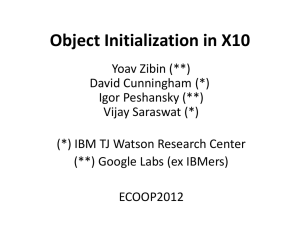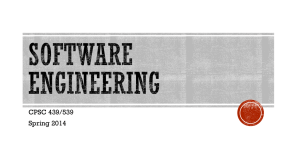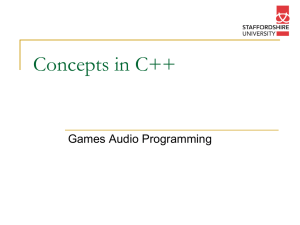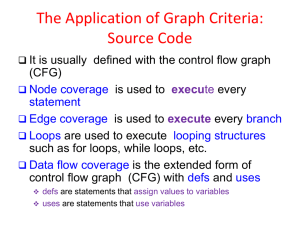Breeze-Learn
advertisement
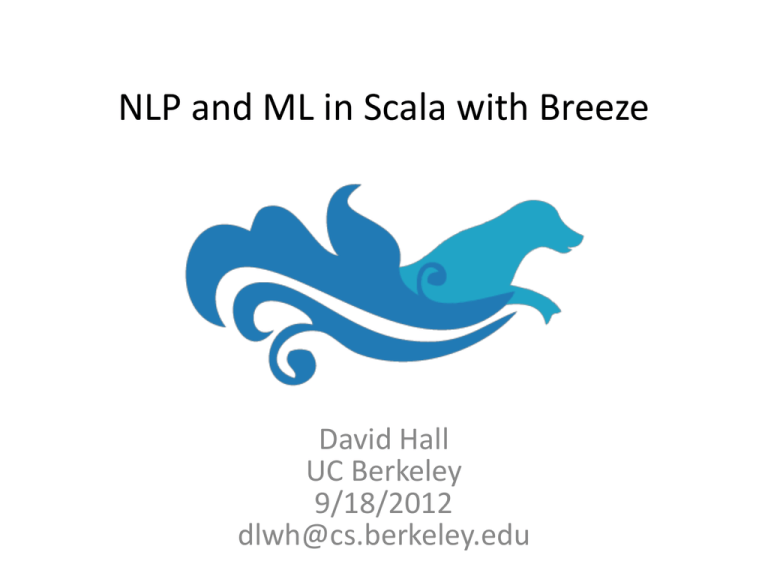
NLP and ML in Scala with Breeze
David Hall
UC Berkeley
9/18/2012
dlwh@cs.berkeley.edu
What Is Breeze?
What Is Breeze?
≥
Dense Vectors, Matrices, Sparse Vectors,
Counters, Decompositions, Graphing, Numerics
What Is Breeze?
≥
Stemming, Segmentation,
Part of Speech Tagging, Parsing (Soon)
What Is Breeze?
≥
Nonlinear Optimization,
Logistic Regression, SVMs,
Probability Distributions
What Is Breeze?
≥
Scalala
+
ScalaNLP/Core
What are Breeze’s goals?
• Build a powerful library that is as flexible as
Matlab, but is still well-suited to building large
scale software projects.
• Build a community of Machine Learning and
NLP practitioners to provide building blocks
for both research and industrial code.
This talk
• Quick overview of Scala
• Tour of some of the highlights:
– Linear Algebra
– Optimization
– Machine Learning
– Some basic NLP
• A simple sentiment classifier
Static vs. Dynamic languages
•
•
•
•
Java
Type Checking
High(ish) performance
IDE Support
Fewer tests
Python
•
•
•
•
Concise
Flexible
Interpreter/REPL
“Duck Typing”
Scala
•
•
•
•
Type Checking
High(ish) performance
IDE Support
Fewer tests
•
•
•
•
Concise
Flexible
Interpreter/REPL
“Duck Typing”
= Concise
Concise: Type inference
val myList = List(3,4,5)
val pi = 3.14159
Concise: Type inference
val myList = List(3,4,5)
val pi = 3.14159
var myList2 = myList
Concise: Type inference
val myList = List(3,4,5)
val pi = 3.14159
var myList2 = myList
myList2 = List(4,5,6) // ok
Concise: Type inference
val myList = List(3,4,5)
val pi = 3.14159
var myList2 = myList
myList2 = List(4,5,6) // ok
myList2 = List(“Test!”) // error!
Verbose: Manual Loops
// Java
ArrayList<Integer> plus1List = new
ArrayList<Integer>();
for(int i: myList) {
plus1List.add(i+1);
}
Concise, More Expressive
val myList = List(1,2,3)
def plus1(x: Int) = x + 1
val plus1List = myList.map(plus1)
Concise, More Expressive
val myList = List(1,2,3)
val plus1List = myList.map(_ + 1)
Gapped
Phrases!
Verbose, Less Expressive
// Java
int sum = 0
for(int i: myList) {
sum += i;
}
Concise, More Expressive
val sum = myList.reduce(_ + _)
Concise, More Expressive
val sum = myList.reduce(_ + _)
val alsoSum = myList.sum
Concise, More Expressive
Parallelized!
val sum = myList.par.reduce(_ + _)
• Title : String
• Body : String
• Location : URL
Verbose, Less Expressive
// Java
public final class Document {
private String title;
private String body;
private URL location;
public Document(String title, String body, URL location) {
this.title = title;
this.body = body;
this.locaiton = location;
}
public String getTitle() { return title; }
public String getBody() {return body; }
public String getURL() { return location; }
@Override
public boolean equals(Object other) {
if(!(other instanceof Document)) return false;
Document that = (Document) other;
return getTitle() == that.getTitle()
&& getBody() == that.getBody()
&& getURL() == that.getURL();
}
public int hashCode() {
int code = 0;
code = code * 37 + getTitle().hashCode();
code = code * 37 + getBody().hashCode();
code = code * 37 + getURL().hashCode();
return code;
}
}
Concise, More Expressive
// Scala
case class Document(
title: String,
body: String,
url: URL)
Scala: Ugly Python
# Python
def foo(size, value):
[ i + value for i in range(size)]
Scala: Ugly Python
# Python
def foo(size, value):
[ i + value for i in range(size)]
// Scala
def foo(size: Int, value: Int) = {
for(i <- 0 until size)
yield i + value
}
Scala: Ugly Python
// Scala
class MyClass(arg1: Int, arg2: T) {
def foo(bar: Int, baz: Int) = {
…
}
def equals(other: Any) = {
// …
}
}
Scala: Ugly Python?
# Python
class MyClass:
def __init__(self, arg1, arg2):
self.arg1 = arg1
self.arg2 = arg2
def foo(self, bar, baz):
#…
def __eq__(self, other):
#…
Pretty
Scala: Ugly Python
# Python
class MyClass:
def __init__(self, arg1, arg2):
self.arg1 = arg1
self.arg2 = arg2
def foo(self, bar, baz):
#…
def __eq__(self, other):
#…
Scala: Fast Pretty Python
Scala: Fast Pretty Python
Scala: Performant, Concise, Fun
• Usually within 10% of Java for ~1/2 the code.
• Usually 20-30x faster than Python, for ± the
same code.
• Tight inner loops can be written as fast as Java
– Great for NLP’s dynamic programs
– Typically pretty ugly, though
• Outer loops can be written idiomatically
– aka more slowly, but prettier
Scala: Some Downsides
• IDE support isn’t as strong as for Java.
– Getting better all the time
• Compiler is much slower.
Learn more about Scala
https://www.coursera.org/course/progfun
Starts today!
Getting started
libraryDependencies ++= Seq(
// other dependencies here
// pick and choose:
"org.scalanlp" %% "breeze-math" % "0.1",
"org.scalanlp" %% "breeze-learn" % "0.1",
"org.scalanlp" %% "breeze-process" % "0.1",
"org.scalanlp" %% "breeze-viz" % "0.1"
)
resolvers ++= Seq(
// other resolvers here
// Snapshots: use this. (0.2-SNAPSHOT)
"Sonatype Snapshots" at
"https://oss.sonatype.org/content/repositories/snapshots/"
)
scalaVersion := "2.9.2"
Breeze-Math
Linear Algebra
import breeze.linalg._
val x = DenseVector.zeros[Int](5)
// DenseVector(0, 0, 0, 0, 0)
val m = DenseMatrix.zeros[Int](5,5)
val r = DenseMatrix.rand(5,5)
m.t // transpose
x + x // addition
m * x // multiplication by vector
m * 3 // by scalar
m * m // by matrix
m :* m // element wise mult, Matlab .*
Linear Algebra: Return type selection
scala> val dv = DenseVector.rand(2)
dv: breeze.linalg.DenseVector[Double] =
DenseVector(0.42808779630213867, 0.6902430375224726)
scala> val sv = SparseVector.zeros[Double](2)
sv: breeze.linalg.SparseVector[Double] = SparseVector()
scala> dv + sv
Dense
res3: breeze.linalg.DenseVector[Double] =
DenseVector(0.42808779630213867, 0.6902430375224726)
scala> (dv: Vector[Double]) + (sv: Vector[Double])
res4: breeze.linalg.Vector[Double] =
DenseVector(0.42808779630213867, 0.6902430375224726)
Static: Vector
scala> (sv: Vector[Double]) + (sv: Vector[Double])
res5: breeze.linalg.Vector[Double] = SparseVector()
Dynamic: Dense
Static: Vector
Dynamic: Sparse
Linear Algebra: Slices
m(::,1) // slice a column
// DenseVector(0, 0, 0, 0, 0)
m(4,::) // slice a row
m(4,::) := DenseVector(1,2,3,4,5).t
m.toString:
0 0 0 0 0
0 0 0 0 0
0 0 0 0 0
0 0 0 0 0
1 2 3 4 5
Linear Algebra: Slices
m(0 to 1, 3 to 4).toString
//0 0
//2 3
m(IndexedSeq(3,1,4,2),IndexedSeq(4,4,3,1))
//0
//0
//5
//0
0
0
5
0
0
0
4
0
0
0
2
0
UFuncs
import breeze.numerics._
log(DenseVector(1.0, 2.0, 3.0, 4.0))
// DenseVector(0.0, 0.6931471805599453,
// 1.0986122886681098, 1.3862943611198906)
exp(DenseMatrix( (1.0, 2.0), (3.0, 4.0)))
sin(Array(2.0, 3.0, 4.0, 42.))
// also sin, cos, sqrt, asin, floor, round, digamma,
trigamma
UFuncs: Implementation
trait Ufunc[-V, +V2] {
def apply(v: V):V2
def apply[T,U](t: T)(implicit cmv:
CanMapValues[T, V, V2, U]):U = {
cmv.map(t, apply _)
}
}
// elsewhere:
val exp = UFunc(scala.math.exp _)
UFuncs: Implementation
new CanMapValues[DenseVector[V], V, V2, DenseVector[V2]] {
def map(from: DenseVector[V], fn: (V) => V2) = {
val arr = new Array[V2](from.length)
val d = from.data
val stride = from.stride
var i = 0
var j = from.offset
while(i < arr.length) {
arr(i) = fn(d(j))
i += 1
j += stride
}
new DenseVector[V2](arr)
}
}
URFuncs
val r = DenseMatrix.rand(5,5)
// sum all elements
sum(r):Double
// mean of each row into a single column
mean(r, Axis._1): DenseVector[Double]
// sum of each column into a single row
sum(r, Axis._0): DenseMatrix[Double]
// also have variance, normalize
URFuncs: the magic
trait URFunc[A, +B] {
def apply(cc: TraversableOnce[A]):B
def apply[T](c: T)(implicit urable: UReduceable[T, A]):B = {
urable(c, this)
}
Optional Specialized
Impls
def apply(arr: Array[A]):B = apply(arr, arr.length)
def apply(arr: Array[A], length: Int):B = apply(arr, 0, 1, length, {_ => true})
def apply(arr: Array[A], offset: Int, stride: Int, length: Int, isUsed: Int=>Boolean):B = {
apply((0 until length).filter(isUsed).map(i => arr(offset + i * stride)))
}
def apply(as: A*):B = apply(as)
def apply[T2, Axis, TA, R](
c: T2,
axis: Axis)
(implicit collapse: CanCollapseAxis[T2, Axis, TA, B, R],
ured: UReduceable[TA, A]): R = {
collapse(c,axis)(ta => this.apply[TA](ta))
}
}
How Axis stuff works
URFuncs: the magic
trait Tensor[K, V] {
// …
def ureduce[A](f: URFunc[V, A]) = {
f(this.valuesIterator)
}
}
trait DenseVector[E] … {
override def ureduce[A](f: URFunc[E, A]) = {
if(offset == 0 && stride == 1)
f(data, length)
else
f(data, offset, stride, length, {(_:Int) => true})
}
}
Breeze-Viz
Breeze-Viz
• VERY ALPHA API
• 2-d plotting, via JFreeChart
• import breeze.plot._
Plotting
val f = Figure()
val p = f.subplot(0)
val x = linspace(0.0,1.0)
p += plot(x, x :^ 2.0)
p += plot(x, x :^ 3.0, '.')
p.xlabel = "x axis"
p.ylabel = "y axis"
f.saveas("lines.png") // also pdf, eps
Plotting
Plotting
val p2 = f.subplot(2,1,1)
val g = Gaussian(0,1)
p2 += hist(g.sample(100000),100)
p2.title = "A normal distribution”
Plotting
Breeze-Learn
Breeze-Learn
• Optimization
• Machine Learning
• Probability Distributions
Breeze-Learn
• Optimization
– Convex Optimization: LBFGS, OWLQN
– Stochastic Gradient Descent: Adaptive Gradient
Descent
– Linear Program DSL, solver
– Bipartite Matching
Optimize
Optimize
trait DiffFunction[T] extends (T=>Double) {
/** Calculates both the value and the gradient at a point */
def calculate(x:T):(Double,T);
}
Optimize
val df = new DiffFunction[DV[Double]] {
def calculate(values: DV[Double]) = {
val gradient = DV.zeros[Double](2)
val (x,y) = (values(0),values(1))
val value = pow(x* x + y - 11, 2) +
pow(x + y * y - 7, 2)
gradient(0) = 4 * x * (x * x + y - 11) +
2 * (x + y * y - 7)
gradient(1) = 2 * (x * x + y - 11) +
4 * y * (x + y * y - 7)
(value, gradient)
}
}
Optimize
val lbfgs = new LBFGS[DenseVector[Double]]
lbfgs.minimize(df, DenseVector.rand(2))
// DenseVector(2.999983, 2.000046)
Optimize
val lbfgs = new LBFGS[DenseVector[Double]]
lbfgs.minimize(df, DenseVector.rand(2))
// DenseVector(2.999983, 2.000046)
Breeze-Learn
• Classify
– Logistic Classifier
– SVM
– Naïve Bayes
– Perceptron
Breeze-Learn
val trainingData = Array (
Example("cat",
Counter.count("fuzzy","claws","small")),
Example("bear",
Counter.count("fuzzy","claws","big”)),
Example("cat",
Counter.count("claws","medium”))
)
val testData = Array(
Example("????", Counter.count("claws","small”))
)
Breeze-Learn
new LogisticClassifier
.Trainer[L,Counter[T,Double]]()
val classifier = trainer.train(trainingData)
classifier(Counter.count(“fuzzy”, “small”)) == “cat”
Breeze-Learn
• Distributions
– Poisson, Gamma, Gaussian, Multinomial, Von
Mises…
– Sampling, PDF, Mean, Variance, Maximum
Likelihood Estimation
Breeze-Learn
val poi = new Poisson(3.0)
val samples = poi.sample(1000)
meanAndVariance(samples.map(_.toDouble))
// (2.989999999999995,3.0009009009009)
(poi.mean, poi.variance)
// (Double, Double) = (3.0,3.0)
Let’s build something…
• Sentiment Classification
– Given a movie review, predict whether it is
positive or negative.
• Dataset:
– Bo Pang, Lillian Lee, and Shivakumar
Vaithyanathan, Thumbs up? Sentiment
Classification using Machine Learning Techniques,
EMNLP 2002
– http://www.cs.cornell.edu/people/pabo/moviereview-data/
Anatomy of a Classifier
+x
Anatomy of a Classifier
+
wonderful
wonder-
+
a
seeseen
epic
Anatomy of a Classifier
+
wonderful
wondera
seeseen
epic
Index[Feature]
Anatomy of a Classifier
f(x)
Let’s build something…
object SentimentClassifier {
case class Params(
@Help(text="Path to txt_sentoken in the dataset.")
train:File,
help: Boolean = false)
// …
Parsing command line options
def main(args: Array[String]) {
// Read in parameters, ensure they're right and dump help
if necessary
val (config,seqArgs) =
CommandLineParser.parseArguments(args)
val params = config.readIn[Params](“”)
if(params.help) {
println(GenerateHelp[Params](config))
sys.exit(1)
}
Reading in data
val tokenizer = breeze.text.LanguagePack.English
val data: Array[Example[Int, IndexedSeq[String]]] = {
for {
dir <- params.train.listFiles();
f <- dir.listFiles()
} yield {
val slurped = Source.fromFile(f).mkString
val text = tokenizer(slurped).toIndexedSeq
// data is in pos/ and neg/ directories
val label = if(dir.getName =="pos") 1 else 0
Example(label, text, id = f.getName)
}
}
Some useful processing stuff:
val langData = breeze.text.LanguagePack.English
// Porter Stemmer
val stemmer = langData.stemmer.get
Porter stemmer examples
scala> PorterStemmer(”waste")
res15: String = wast
scala> PorterStemmer(”wastes")
res16: String = wast
scala> PorterStemmer(”wasting")
res17: String = wast
scala> PorterStemmer(”wastetastic")
res18: String = wastetast
Some features
sealed trait Feature
case class WordFeature(w: String) extends Feature
case class StemFeature(w: String) extends Feature
// We're going to use SparseVector representations
// of documents.
// An Index maps Features to Ints and back again.
val featureIndex = Index[Feature]()
Extract features for each example
def extractFeatures(ex: Example[Int, ISeq[String]]) = {
ex.map { words =>
val builder = new SparseVector.Builder[Double](Int.MaxValue)
for(w <- words) {
val fi = featureIndex.index(WordFeature(w))
val s = stemmer(w)
val si = featureIndex.index(StemFeature(s))
builder.add(fi, 1.0)
builder.add(si, 1.0)
}
builder
}
}
Extract features for each example
val extractedData = (
data
map(extractFeatures)
map { ex =>
ex.map{ builder =>
builder.dim = featureIndex.size
builder.result()
}
}
)
Build the classifier!
val (train, test) = splitData(extractedData)
val opt = OptParams(maxIterations=60,
useStochastic=false,
useL1=true) // L1 regularization gives a sparse model
val classifier = new LogisticClassifier.Trainer[Int,
SparseVector[Double]](opt).train(train)
val stats = ContingencyStats(classifier, test)
println(stats)
Top weights
StemFeature(bad) 0.22554878
WordFeature(bad) 0.22435212
StemFeature(wast) 0.1472285
StemFeature(look) 0.14148404
WordFeature(worst) 0.138328
StemFeature(worst) 0.138328
StemFeature(attempt) 0.13563
StemFeature(bore) 0.1226431
WordFeature(only) 0.116272
StemFeature(onli) 0.116272
StemFeature(plot) 0.1162459
WordFeature(unfortunately)
StemFeature(see) -0.11374918
WordFeature(nothing) 0.1134
StemFeature(noth) 0.113431
WordFeature(seen) -0.11184
StemFeature(seen) -0.1118435
WordFeature(great) -0.10769
StemFeature(suppos) 0.10752
StemFeature(great) -0.107476
Breeze: What’s Next?
•
•
•
•
Improved tokenization, segmentation
Cross-lingual stuff
GPU matrices (via JavaCL or JCUDA)
More powerful/customizable classification
routines
• Epic: platform for “real NLP”
– Parsing, Named Entity Recognition,
POS Tagging, etc.
– Hall and Klein (2012)
Thanks!
https://github.com/dlwh/breeze
http://scalanlp.org
No really, who is Breeze?


